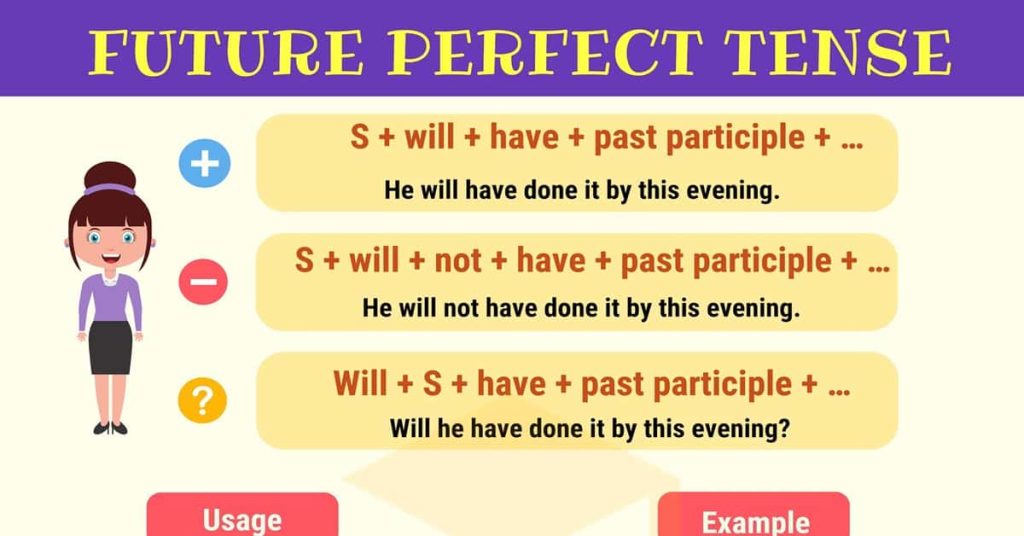The Future Perfect Tense: A Gateway to Advanced Language Proficiency in IELTS
The Future Perfect Tense, a distinctive grammatical structure in English, holds a unique position in language proficiency, particularly within the context of the International English Language Testing System (IELTS). This tense allows us to envision actions or events that will be completed or fully realized at a specific point in the future, offering a glimpse into the complexity of the English language. In this essay, we will explore the definition, structure, usage, and impact of the Future Perfect Tense on the IELTS test, highlighting its role in enhancing grammatical range and accuracy.

1. What is the future perfect tense?
The Future Perfect Tense is a grammatical construction that refers to an action or event that will be completed or perfected at some point in the future before a specific time of reference. It is structured by combining the future tense of the auxiliary verb “will” or “shall” with the base form of “have” and the past participle of the main verb.
2. What is the format of the future perfect tense?
The structure of the Future Perfect Tense can be outlined as follows:
Affirmative:
- Subject + will/shall + have + past participle of the main verb
Negative:
- Subject + will/shall + not + have + past participle of the main verb
Interrogative:
- Will/Shall + subject + have + past participle of the main verb
>>Suggestion article: the near future tense

3. What is the usage of the future perfect tense?
The Future Perfect Tense is used to describe an action or event that will be completed or perfected at a specific point in the future before another action, event, or time of reference. It emphasizes the completion or achievement of a particular task before a specified future moment, highlighting the relationship between two future occurrences. Here are the primary usages of the Future Perfect Tense:
3.1. Expressing Completed Actions Before a Specific Future Time
The Future Perfect Tense is utilized to describe an action that will be completed before a particular time or event in the future.
- By 10 PM tonight, I will have finished my assignment.
- They will have arrived at the airport before the flight takes off.
3.2. Discussing Achievements or Accomplishments
It is used to emphasize accomplishments or achievements that will occur before a designated future moment.
- By the end of the year, she will have published her first novel.
- He will have completed his master’s degree by next May.
3.3. Narrating a Sequence of Future Events
The Future Perfect Tense helps in narrating a sequence of events that will be completed in the future, demonstrating a structured timeline of actions.
- By the time they arrive, we will have set up the event and welcomed the guests.
- When you wake up tomorrow, I will have left for work.
3.4. Hypothetical Future Situations
It can also be used in hypothetical or conditional statements to express a hypothetical situation that would result in a completed action in the future.
- If you call me before 8 PM, I will have cooked dinner.
- By the time you arrive, I will have cleaned the entire house.
3.5. Expressing Assumptions or Predictions about the Past
In informal language, the Future Perfect Tense can be used to make assumptions or predictions about the past, especially when emphasizing something was certain or inevitable.
- He’s late; he will have missed the train.
4. Is future perfect tense affect your IELTS test?
The accurate and appropriate use of the Future Perfect Tense can positively impact your performance in the IELTS test, particularly in the writing and speaking sections. Here’s how the Future Perfect Tense can affect your grammar in IELTS:
4.1. Enhances Grammatical Range and Accuracy
Effectively utilizing the Future Perfect Tense in your responses demonstrates a wide range of grammatical structures and tenses. This showcases your grammatical versatility and ability to accurately use a more advanced tense, contributing to a higher score in the IELTS exam.
4.2. Elevates Language Complexity
Incorporating the Future Perfect Tense in your writing and speaking adds complexity to your language. It allows you to convey actions or events that will be completed before a specific future time, emphasizing a deeper understanding of the English language.
4.3. Demonstrates Language Proficiency
Correct usage of the Future Perfect Tense reflects a higher level of language proficiency and fluency. It shows that you can not only communicate in present and past tenses but also in complex future tenses, crucial for conveying future-related ideas effectively in the IELTS test.
4.4. Contributes to Coherence and Cohesion
Implementing the Future Perfect Tense appropriately contributes to a more structured and coherent response, especially in the IELTS writing section. It helps you organize your ideas and thoughts in a clear, chronological manner, enhancing coherence and cohesion, which are essential assessment criteria.
4.5. Shows Mastery of Advanced Language Features
Utilizing the Future Perfect Tense effectively signifies your understanding and mastery of advanced language features. This, in turn, positively influences the examiner’s perception of your language skills and may result in a higher score.

Exercise 1: Rewrite the sentences in the Future Perfect Tense.
I will finish my work.
- Answer: I will have finished my work.
They will complete the project.
- Answer: They will have completed the project.
Exercise 2: Create sentences using the Future Perfect Tense. Choose the correct verb and form it accordingly.
She / read the book
- Answer: She will have read the book.
They / prepare the presentation
- Answer: They will have prepared the presentation.
Exercise 3: Form negative sentences using the Future Perfect Tense.
She will have completed the task.
- Answer: She will not have completed the task.
They will have arrived by noon.
- Answer: They will not have arrived by noon.
Exercise 4: Ask questions using the Future Perfect Tense.
You / finish the assignment
- Answer: Will you have finished the assignment?
He / write the report
- Answer: Will he have written the report?
Exercise 5: Complete the sentences using the Future Perfect Tense.
By this time tomorrow, we __________ (watch) the movie.
- Answer: By this time tomorrow, we will have watched the movie.
She __________ (study) for eight hours by the evening.
- Answer: She will have studied for eight hours by the evening.
In essence, the Future Perfect Tense serves as a pathway to elevated language proficiency, guiding candidates toward a more sophisticated and nuanced expression of future events. Embracing this grammatical structure not only advances linguistic skills but also opens doors to articulate ideas, thoughts, and plans with eloquence and finesse in the competitive arena of the IELTS examination. Start doing IELTS online test now!